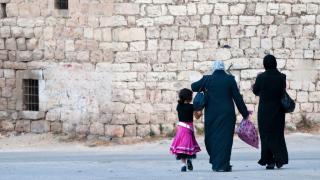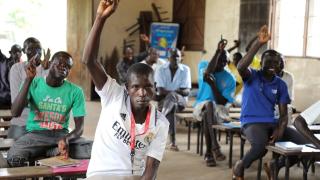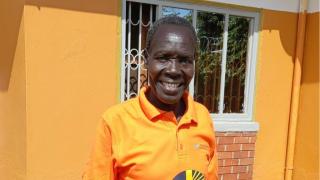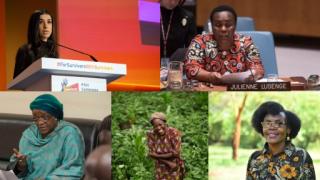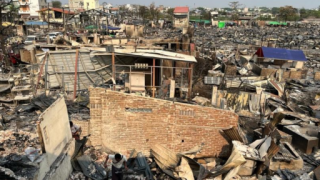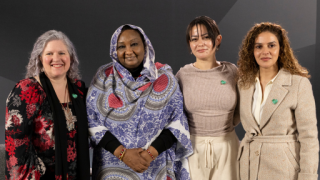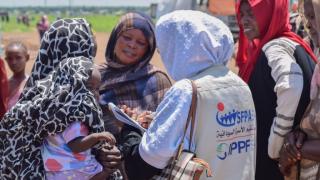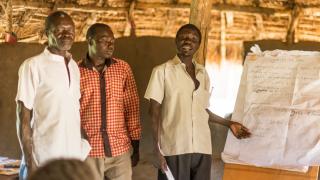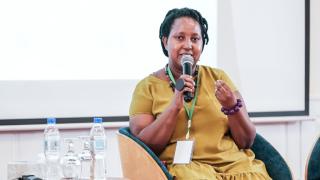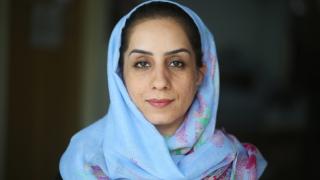Thank you for staying connected
Thank you for staying connected!
We're so glad to have you with us
You and our global community make our work supporting women survivors to rebuild their lives possible.
To see our recent work, head to our homepage or explore our blogs below.
read recent blogs
To mark International Day for the Elimination of Sexual Violence in Conflict, we are amplifying the voices of women who are not just enduring the harsh realities of war and displacement - but who are also working every day to protect, support and empower others. Hear from two women in Palestine.
At Women for Women International, we count a number of dedicated and compassionate male staff among our global community working towards a more equitable future. I spoke to several of our male colleagues – from Iraq and South Sudan, to DRC and the UK. I asked what allyship means to them, how their work has shaped their understanding of gender justice, and what they’ve learned from the women in their lives. What emerged was not just a collection of stories, but a testament to the quiet, determined work of transformation – both personal and societal.
Florence Dumba is a social empowerment trainer at Women for Women International in South Sudan. Her work, working with survivors and creating safe spaces for women to heal from their trauma, is grounded in her own experience of being abducted twice.
In honour of the International Day for the Elimination of Sexual Violence in Conflict, we spotlight five extraordinary women leading the fight against this devastating form of violence. From Nobel laureates to grassroots activists, these changemakers are demanding justice, breaking silence and creating hope for survivors around the world.
On March 28, 2025, a powerful 7.7-magnitude earthquake struck Myanmar, intensifying a crisis already marked by armed conflict, political instability, and widespread displacement. What was once a complex humanitarian emergency has now deepened into a compounded catastrophe - one that disproportionately affects women and girls. As infrastructure collapses and humanitarian access becomes even more restricted, the disaster has laid bare the urgent need for gender-sensitive responses in conflict-affected settings.
CSW 69: One Month Later
subtitle:
Read our reflection blog on CSW 69 - coming 30 years after the landmark Beijing Platform for Action, it felt like a once-in-a-generation opportunity - an invitation for bold thinking, for reshaping decision-making spaces, and for shifting the dial on whose expertise is recognised and integrated into peacebuilding and the broader Women, Peace and Security (WPS) agenda.
Read about how Dr. Asma Elnaeem and Dr. Hiba Ahmed are providing vital healthcare and support to women in Sudan amidst the ongoing conflict, showing incredible resilience despite immense challenges.
The new Netflix show Adolescence has captivated audiences across the UK, tackling the pressing issue of boys and young men being radicalised through online communities that promote harmful and extreme ideas about masculinity. But what does the show have to do with our work in conflict-affected countries, where life on the ground looks very different?
Reparations and the WPS Agenda
subtitle:
Read about Global Policy and Advocacy Manager, Maryline Njoroge's reflections on presenting at a panel at the GIMAC conference: “Peace, Security, and Reparative Justice: Addressing the colonial legacy and its gendered impact”.
Our partnership with Monica Vinader is so much more than a financial commitment. It sends a powerful message to women survivors of war that says: I stand with you, you are not alone. Since 2015, our partnership with Monica Vinader has helped over 420 women (and counting!) reach their full potential through our Stronger Women, Stronger Nations programme across the countries we work in.
Women's History Month Film List
subtitle:
Explore powerful films that tell vital stories of women survivors of war - narratives of survival, resistance, and the unwavering spirit of women who continue to rebuild, dream and inspire, even in the darkest of times.
With this global rollback of women’s rights, political polarisation, international aid cuts and the escalation of conflicts, the news provides a constant barrage of devastating images and negative statistics. It’s no wonder many of us feel angry and hopeless. Yes the women we serve, living in the world's most dangerous places, continue to dream and believe in a brighter future. Read their advice on how to hold onto hope.

